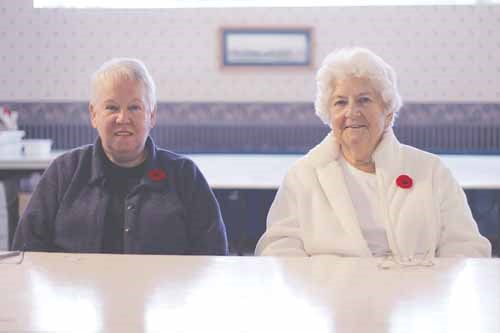With each Remembrance Day, it becomes more obvious.
Few of the World War II veterans who once made the Royal Canadian Legion a thriving club in nearly every community across Canada are still alive. Even fewer remain an active part of the Legion.
In recent years, governance of Legion branches in Yorkton and other centres has shifted to a second generation of volunteers, many of them peacetime veterans in their 50s and 60s. But a growing majority of executive members have no military background at all.
While they have various reasons for involving themselves, one motivation seems to be common to all.
"I think the Legion is a very important part of our society," says Harold Petkau, third vice president of the Yorkton Legion General Alexander Ross Branch #77. "It needs to be here for a long time to come."
Petkau has never served in the military, and has no close family members who were veterans. He only became familiar with the Legion as an adult when his father-in-law, an air force member, began inviting him for regular visits to the local club.
But Petkau saw something of value in the organization, and one year ago, after a long absence, he involved himself again-this time at the executive level.
Others have had a lifelong relationship with the service club.
"I grew up with the Legion," says Membership Chair Barbara Cyr, who has been part of the Yorkton Legion for 32 years and various other branches since childhood. Cyr's husband Victor was a career serviceman who joined the Royal Canadian Army Service Corps in the late 1940s after the war's end. For her and Victor, involvement in the Legion was both a matter of tradition and a social opportunity. Legions were the same everywhere.
"When we traveled, which was every summer, we usually would stop at a Legion in all these small towns. Some of them were open, some of them weren't, but you were always welcome there."
First Vice President Brucine Saigeon, the daughter of a North America-stationed WWII veteran, agrees: she always knew the Legion as a social club and a "safe place."
But like Petkau, both Cyr and Saigeon have stayed on for larger reasons.
Many Legions across Canada are dying as their core membership passes away. Saigeon watched it happen firsthand to her former branch in Calgary.
"I swore at that time, 'That's it. I'm not getting involved again.' But here I am."
She couldn't ignore what she saw as the Legion's vital mission.
"I really believe in the whole purpose to the Legion. I know we're losing our vets, but we still need a place for them, we still need to respect them, we still need our children to understand what it's all about."
The latter point has been on Cyr's mind. She points out that in Holland, nearly every citizen seems to have a deep-seated reverence for the Canadian soldiers who liberated that country.
"They have never let their children forget what the Canadians did."
But Canadian children seem to have a much weaker grasp on the significance of the war, she says. It's a trend she wants to fight against.
It can be difficult as an outsider, acknowledges Saigeon, to take up the torch of remembrance from those who lit it-to pass on lessons that she has learned only secondhand.
"It's very difficult, because we can be told or we can read about it, but if you haven't experienced it, it's not quite the same."
But it has to be done, says Petkau.
"You have to get your head around it so that you're no different from anybody else. They're the ones that fought the war, but they appreciate somebody coming in and continuing the work and service that they started. That's how they look at it."
While the Legion has been slow to adapt, it has become a far more welcoming organization in recent decades. Membership is open to everyone; Legion events and services are open even to non-members.
Petkau believes that part of the key to keeping the Legion alive is spreading awareness of these changes to younger community members who still see the organization as a fraternity of aged veterans.
It is still that fraternity, and still a society devoted to honoring and preserving pieces of history, but the energy and social elements that made the Legion such a success in past decades also remain alive, Petkau says.
"It's more than just work. There's a lot of fun. There's comradeship."
Preserving this side of the organization is just as important, suggests Saigeon.
"You have to balance them both. You've got to get stuff going so that there's people coming and seeing that it is a good place to come."
Whatever the Legion's future, much of it will lie with people who have never known war.
"In order for our children's children to still realize that November 11 is more than just an ordinary day, people like myself or my sons are going to have to come forward," says Petkau.



